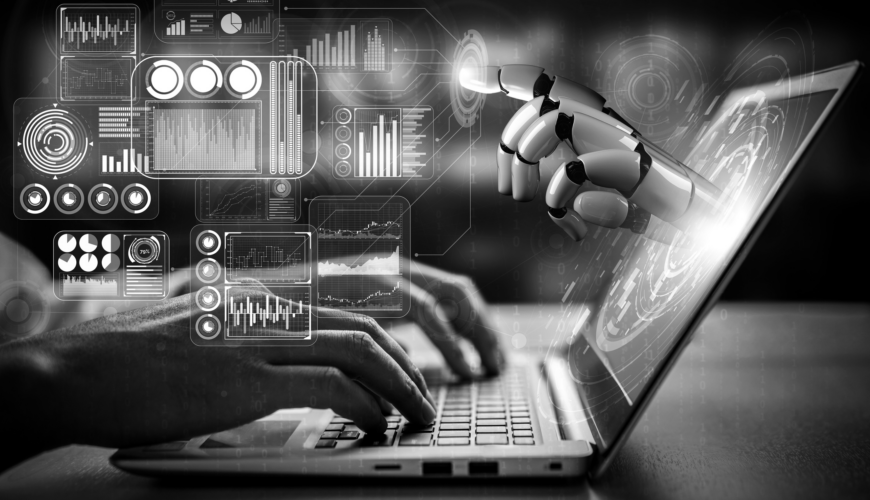How AI and Machine Learning Transforming the Workforce
What will the future of supply chain management look like? As we stand at the intersection of technology and industry, the supply chain sector is poised for a significant transformation driven by advancements in artificial intelligence (AI) and machine learning (ML). These innovations promise to enhance efficiency, reduce costs, and increase responsiveness across the supply chain. However, they pose challenges, particularly for traditional roles such as supply chain planners and clerical workers. This article explores the implications of AI and ML on these jobs, the evolving skill requirements, and the overall impact on the industry.
What’s shaping the future of supply chain management?
The Rise of AI and Machine Learning in Supply Chain
AI and ML have already begun to permeate various aspects of supply chain management. From demand forecasting and inventory optimization to route planning and supplier selection, these technologies can analyze vast amounts of data more quickly and accurately than any human could. For instance, predictive analytics can forecast demand fluctuations by considering historical data, market trends, and weather patterns. This capability significantly reduces the reliance on traditional planning methods, often involving manual data entry and subjective judgment.
As AI algorithms learn from new data, they become increasingly adept at identifying patterns and making recommendations. This dynamic learning process allows for continuous improvement in operational efficiencies, leading to cost savings and improved service levels. Consequently, businesses that leverage these technologies can achieve a competitive advantage, forcing others in the industry to follow suit.
Disruption of Traditional Roles
The rapid adoption of AI and ML in supply chain operations raises important questions about the future of traditional roles such as supply chain planners and clerical workers. Historically, these positions have relied on experience, intuition, and manual processes. However, many of these roles may become redundant as AI systems take over routine tasks—like data entry, order processing, and basic analysis.
For instance, supply chain planners who once spent hours compiling reports and forecasts may find that AI tools can generate these outputs in real-time. This shift will likely reduce the demand for entry-level positions while increasing the need for roles that focus on interpreting AI-generated insights and making strategic decisions based on them. The job landscape is not disappearing; instead, the future of supply chain management jobs is evolving.
Skills for the Future of Supply Chain Management
The displacement of traditional roles necessitates reevaluating the skills required in the supply chain workforce. As AI takes over routine tasks, professionals must adapt by acquiring new skills that complement these technologies. Data analysis, strategic thinking, and advanced problem-solving skills will become essential.
Moreover, understanding AI and ML concepts will be crucial for supply chain professionals. Familiarity with data analytics tools and software will empower employees to leverage AI effectively. Organizations must prioritize upskilling their workforce through training programs focusing on these competencies, ensuring that employees thrive in a technology-driven environment.
Soft skills such as collaboration, communication, and adaptability will also become increasingly valuable. As teams work alongside AI systems, the ability to interpret and act on insights generated by these tools will require a human touch. Strong interpersonal skills will be essential for fostering collaboration between human workers and AI systems, ensuring that organizations can harness the full potential of their technological investments.

The New Role of Supply Chain Planners
While the role of supply chain planners will undoubtedly change, it will not vanish. Instead, planners will transition from tactical execution to strategic oversight. The focus will shift towards leveraging AI-generated insights to inform decision-making and drive value creation.
For example, rather than spending time on data gathering and analysis, planners will engage in scenario planning, evaluating various market conditions and their potential impact on the supply chain. They will become strategic advisors, working closely with executives to align supply chain strategies with broader business goals.
Moreover, the increasing complexity of global supply chains will require planners to adopt a more holistic approach. They will need to consider internal factors and external influences such as geopolitical dynamics, environmental sustainability, and evolving consumer preferences. This broader perspective will enhance their role as key contributors to organizational success.
The Importance of Human Oversight
While AI and ML can process vast amounts of data and generate insights, human oversight will remain essential. AI systems are not infallible; they are only as good as the data fed into them. Poor data quality can lead to inaccurate forecasts and misguided decisions. Therefore, supply chain professionals must play a critical role in ensuring data integrity and validating AI-generated insights.
Additionally, ethical considerations surrounding AI deployment must be addressed. Issues such as bias in algorithms and the transparency of AI decision-making processes require careful scrutiny. Supply chain leaders must advocate for responsible AI use, ensuring that technologies are implemented to align with organizational values and ethical standards.
The Role of Technology in Employee Support
As supply chain professionals navigate this changing landscape, technology can also serve as a valuable ally. AI and ML can augment human capabilities, enabling employees to focus on higher-value tasks. For instance, automated workflows can streamline repetitive processes, freeing time for strategic initiatives.
Moreover, AI-powered tools can provide personalized learning experiences for employees, helping them develop the skills needed to thrive in a technology-driven environment. By offering tailored training programs and resources, organizations can empower their workforce to adapt to the evolving demands of the supply chain industry.

Embracing a Culture of Innovation
Organizations must cultivate a culture of innovation to navigate the challenges posed by AI and ML successfully. Embracing new technologies should be viewed as an opportunity rather than a threat. Supply chain leaders must encourage experimentation and continuous improvement, enabling teams to explore new ways of working alongside AI systems.
This cultural shift involves breaking down silos and promoting collaboration across departments. Organizations can unlock synergies and drive more effective outcomes by encouraging cross-functional teams to collaborate on AI initiatives. Moreover, engaging employees in the change process will enhance buy-in and foster a sense of ownership over the transition.
The Global Supply Chain Landscape
The impact of AI and ML on supply chain roles is not limited to any single region or industry. Globally, businesses are recognizing the need to adapt to technological advancements. Emerging markets stand to benefit significantly from the efficiencies that AI can deliver.
As supply chains become increasingly interconnected, leveraging data-driven insights will be paramount. Companies that embrace AI will be better positioned to respond to global disruptions, such as natural disasters or geopolitical events, ensuring resilience and continuity in their operations.
However, organizations must also be mindful of potential disparities that may arise. As technology advances, there is a risk that those unable to adapt—whether due to a lack of resources, skills, or infrastructure—could be left behind. Policymakers and industry leaders must collaborate to address these challenges, ensuring that the benefits of AI are accessible to all players in the supply chain ecosystem.
A Transformative Journey
Integrating AI and machine learning into supply chain operations represents a transformative journey. While this evolution may disrupt traditional roles, it also opens new opportunities for growth and innovation. Supply chain planners and clerical workers must embrace change, adapt their skills, and collaborate with AI systems to thrive in the future landscape.
As organizations navigate this transition, a commitment to continuous learning, ethical AI use, and a culture of innovation will be crucial. By proactively addressing these challenges, the supply chain industry can harness the power of AI and ML to create a more efficient, resilient, and sustainable future.
In conclusion, the future of supply chain management is bright, characterized by the synergy between human intelligence and artificial intelligence. By embracing this change, supply chain professionals can position themselves at the forefront of this exciting transformation, ready to drive value and innovation in the years to come.


